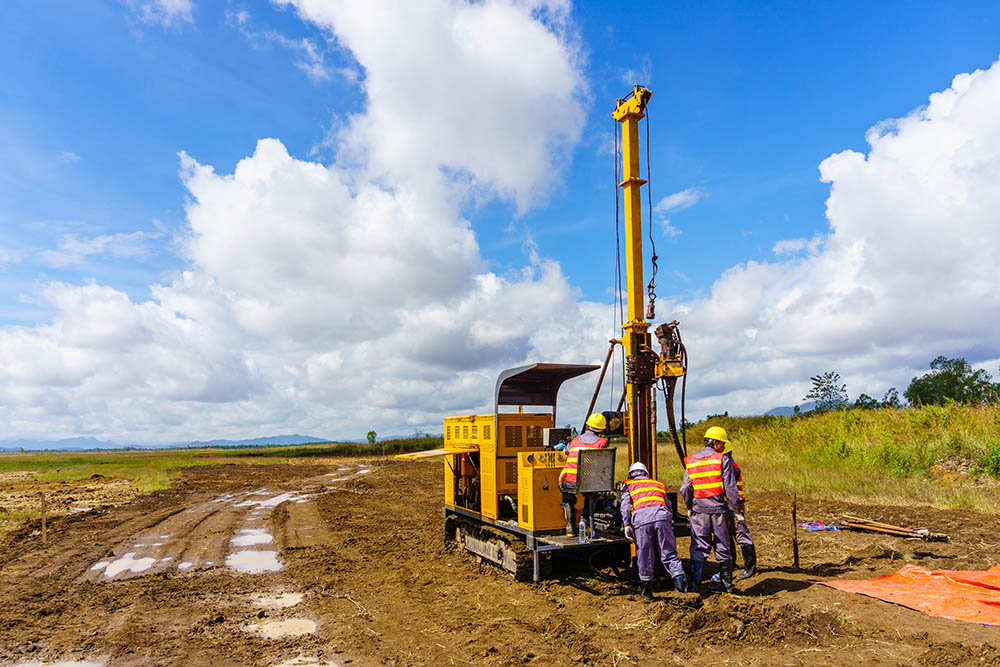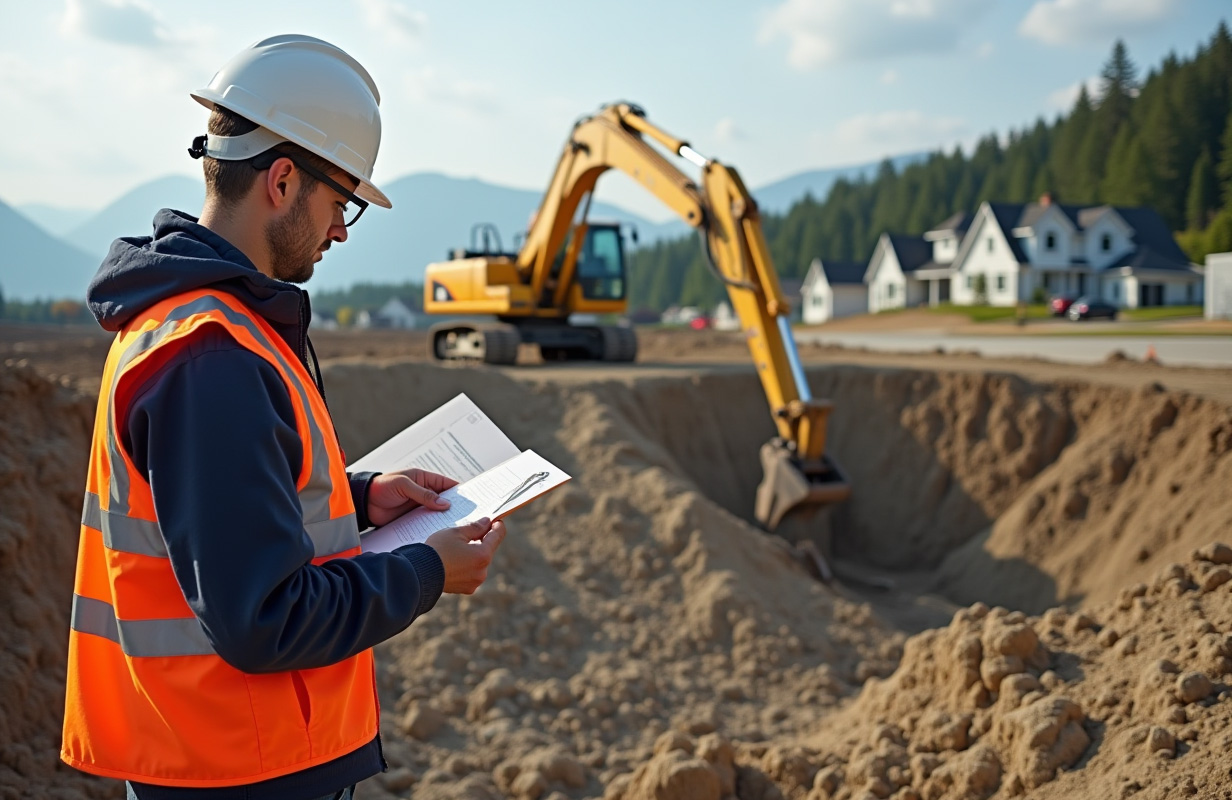Geotechnical Engineer Description: What to Anticipate from These Professionals
Geotechnical Engineer Description: What to Anticipate from These Professionals
Blog Article
The Importance of Geotechnical Engineering in Addressing Ecological Obstacles and Enhancing Building And Construction Safety And Security
Geotechnical design serves as a keystone in the crossway of ecological stewardship and building safety, giving vital insights right into the behavior of soil and rock under various problems. By executing strategic website investigations and customized mitigation steps, geotechnical designers play an important duty in protecting both human lives and eco-friendly integrity.

Role of Geotechnical Engineering
Geotechnical engineering plays a crucial role in the design and construction of infrastructure by dealing with the behavior of soil and rock products under different conditions. This field of engineering is important for understanding the interaction in between frameworks and the ground, which consists of figuring out the load-bearing capability of soil, assessing security, and forecasting possible settlement or failure.
Geotechnical designers are accountable for carrying out site investigations, which entail tasting and testing dirt and rock to collect data on their physical and chemical residential or commercial properties. This information is essential for creating foundations, retaining wall surfaces, and other earth-retaining structures that make certain security and longevity. In addition, geotechnical engineering informs the option of suitable construction approaches and materials, therefore lessening risks connected with soil actions.
In addition, the integration of geotechnical design principles right into urban planning and ecological management is critical for dealing with obstacles such as ground contamination and groundwater management. By comprehending geotechnical factors, engineers can create lasting options that improve the durability of infrastructure against natural risks, while additionally promoting environmental stewardship. Ultimately, the function of geotechnical design is essential for accomplishing safe, resilient, and eco mindful building practices.
Dirt Erosion Reduction
Dirt disintegration presents a considerable threat to both environmental security and facilities stability, impacting approximately 24 billion tons of fertile dirt shed each year worldwide. This phenomenon is aggravated by aspects such as logging, urbanization, and poor agricultural methods. Geotechnical engineering plays an essential function in establishing effective dirt disintegration reduction approaches that safeguard both the setting and building projects.
One approach entails the application of erosion control techniques such as plant life growing, which maintains soil through root systems. In addition, the construction of keeping balconies and wall surfaces can efficiently minimize surface runoff and protect susceptible locations from erosion. Correct water drainage layout is additionally important; it minimizes water build-up and directs excess overflow away from crucial frameworks.
Moreover, geotechnical engineers use dirt stabilization methods, such as the application of geotextiles and eco-friendly floor coverings, to enhance soil cohesion and protect against destruction - geotechnical specialist. Regular surveillance and evaluation of erosion-prone websites enable timely treatments, making sure long-lasting sustainability. By integrating these methods, geotechnical engineering not only mitigates the impacts of soil erosion however likewise adds to the resilience of facilities against ecological obstacles, ultimately cultivating a much safer and more sustainable developed atmosphere
Groundwater Security Approaches
Groundwater acts as an important source for alcohol consumption water, farming, and commercial procedures, making its security crucial for environmental sustainability and public health and wellness. Effective groundwater defense approaches are critical in mitigating contamination risks and ensuring the longevity of this source.

Regular surveillance of groundwater high quality is also essential, making it possible for early detection of contamination resources and helping with prompt remediation initiatives. Utilizing advanced modern technologies, such as geophysical surveys and remote picking up, Web Site aids in identifying prospective threats to groundwater gets.
Additionally, public education and learning and stakeholder interaction are crucial, cultivating community assistance for groundwater protection campaigns. geotechnical companies in south africa. By incorporating regulative actions, technological innovations, and community participation, we can develop an extensive structure that safeguards groundwater resources while promoting lasting development and building techniques
Landslide Threat Administration
Landslides position significant hazards to both human safety and facilities, making reliable risk administration approaches vital. Geotechnical design plays an essential function in recognizing, assessing, and mitigating landslide risks. A detailed understanding of incline security, soil mechanics, and hydrology is crucial for creating reliable threat management plans.
The very first action in landslide threat monitoring entails comprehensive site investigations, which consist of geological mapping and soil screening. These examinations aid designers evaluate the potential for landslides by identifying vital aspects such as incline angles, dirt structure, and water material. Using sophisticated innovations such as remote noticing and geophysical surveys can improve the accuracy of these assessments.
Once risks are identified, appropriate reduction actions can be applied. These might consist of engineering solutions such as retaining wall surfaces, water drainage systems, and incline stabilization techniques. Keeping track of systems should be developed to find indications of ground movement and adjustments in water degrees, allowing for aggressive treatments.

Enhancing Building And Construction Safety And Security
Building and construction sites frequently click for source present a myriad of risks that can endanger worker security and job stability. Geotechnical engineering plays a crucial role in improving building security by providing necessary understandings right into subsurface problems. Via thorough dirt and rock evaluation, geotechnical engineers can determine potential risks, such as soil instability, groundwater concerns, and seismic susceptabilities, which might endanger the safety and security of building activities.
Executing geotechnical services, such as proper structure layout and the look at here now usage of keeping structures, mitigates these threats substantially. These options not only ensure the security of the structures being built yet likewise create a more secure working environment for building and construction workers. Additionally, strenuous tracking and assessment of website conditions throughout the construction procedure are important. Utilizing innovative innovations like ground-penetrating radar and inclinometer systems enables real-time information collection, enabling prompt interventions when hazards are found.
Additionally, cultivating a culture of security with training and adherence to developed safety and security protocols even more improves building and construction website safety. By integrating geotechnical competence right into the preparation and implementation stages, construction projects can achieve higher security requirements, eventually securing employees and making certain effective task conclusion.
Verdict
Finally, geotechnical design works as a critical discipline in promoting and taking on ecological obstacles building and construction security. With efficient soil erosion mitigation, groundwater protection strategies, and landslide threat monitoring, geotechnical designers add to the development of resilient framework. The assimilation of these methods promotes a safer building and construction setting and boosts the sustainability of civil design projects. Ultimately, the knowledge of geotechnical engineers is indispensable in guarding both all-natural resources and human lives against possible risks.
Geotechnical engineering offers as a cornerstone in the crossway of ecological stewardship and construction safety and security, offering essential insights right into the behavior of dirt and rock under numerous conditions. Geotechnical design informs the choice of ideal building approaches and materials, thus decreasing risks connected with dirt behavior.
Geotechnical engineering plays a crucial role in establishing reliable dirt erosion mitigation methods that safeguard both the atmosphere and building tasks.
Furthermore, geotechnical designers use dirt stabilization techniques, such as the application of geotextiles and naturally degradable floor coverings, to boost soil cohesion and avoid deterioration. Via comprehensive soil and rock analysis, geotechnical engineers can determine prospective threats, such as dirt instability, groundwater concerns, and seismic vulnerabilities, which may compromise the safety of building activities.
Report this page